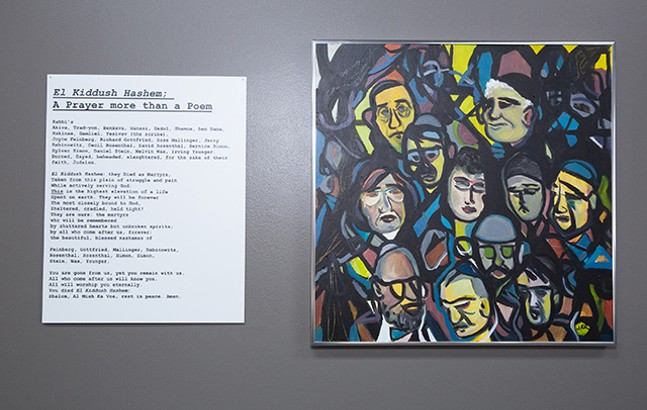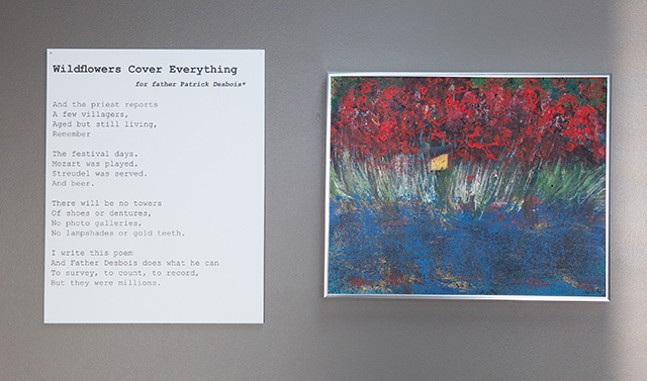
Holocaust Center of Pittsburgh
A painting and poem by Judy Robinson honoring the Tree of Life victims
Robinson, who was born during World War II, says she has always been grateful that she was born in the United States instead of in Europe, where some of her family died in the Holocaust. Her work in this series is a reaction to the Tree of Life shooting, antisemitism, and a continuing pattern of Holocaust denial. Her art helps her to cope with it all, but also serves to remind others to keep these events in their minds.
“I have felt, as I studied that Holocaust, yes, it is the past. As I continue to study, these things don't go away,” says Robinson. “And what can we do about it except try to inform, try to educate, try to keep things in mind so people don't forget and people don't deny?”
Each of the seven paintings in the series is paired with a poem, which sits in place of a tag or info box. Robinson has painted and written poems her whole life, but only recently thought to combine the two art forms.
In the poem “1945 Song,” a woman struggles to forgive in the aftermath of the Holocaust. “A slender woman left behind/rising from the wastes of ash, in bright/pleats of internment cloth,” the poem reads. The accompanying painting features a woman in front of a bright blue and yellow background.
Her painting style is reminiscent of Abstract Expressionism. Sometimes the figures are clear and obvious, and other times a more instinctual reaction to the subject. Robinson dedicated the poem “Wildflowers Cover Everything” to Father Patrick Desbois, a French priest who has spent over 15 years uncovering thousands of previously unknown sites of Jewish execution in former Soviet Union territories. The title of the exhibit comes from the rise of the death toll long after the end of the Holocaust.
“There's all these fields and fields of bodies buried and he found them,” says Robinson. “It's startling new evidence of the horrors of the Holocaust. The wildflowers do cover everything.”
One painting and poem set, “El Kiddush Hashem; A Prayer More Than a Poem” stands out, particularly for its obvious tribute to the victims of Tree of Life. The paintings depict all 11 victims of the shooting; the ones with more detailed faces are the ones Robinson knew personally. Robinson has gone to the Temple all her life, as did her parents and grandparents. The poem lists the names of all the victims and praises them as martyrs. “You are gone from us, yet you remain with us. All who come after us will know you.”

Holocaust Center of Pittsburgh
A tribute to Patrick Desbois, a French priest who uncovered thousands of execution sites
“It's a horrible thing to realize what happened, and I get maybe they don't even mean harm by denying, although many of them do,” says Robinson. “There is this push to deny it all. It's important to me and to the people of the Holocaust Center that that doesn't happen.”
From May 1-7, the Holocaust Center will hold a series of events for Yom HaShoah, the international Holocaust remembrance week, including the Waldman Arts and Writing student competition award ceremony, a commemoration tied in with the Center’s 2019 theme of Women and the Holocaust, and a staging of The Soap Myth starring Ed Asner.
Robinson hopes that her paintings provide a constant reminder of past and present dangers of antisemitism. “[I hope] that you have in your own mind now some more information that gives you some sense of what's right and what's wrong, so when you're confronted or you see this kind of hate that's in the world or people who deny the past, that you'll know better.”

